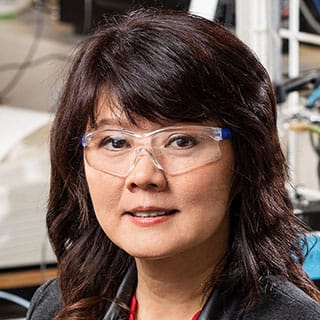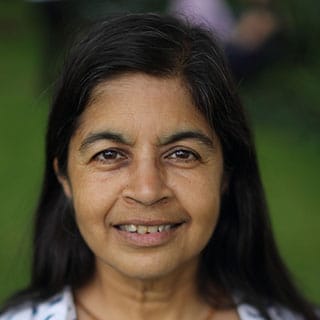
The Royal Society of NSW is delighted that two of its Fellows were named as recipients of the 2019 NSW Premier’s Prizes for Science and Engineering, announced at a ceremony held at Government House, Sydney on the evening of Tuesday, 29 October. Scientia Professor Rose Amal AC FAA FTSE FRSN of UNSW Sydney was named as the 2019 NSW Scientist of the Year , while Payne-Scott Professor Nalini Joshi AO FAA FRSN of the University of Sydney was awarded the Prize for Excellence in Mathematics, Earth Sciences, Chemistry or Physics . The Society most warmly congratulates both Rose and Nalini on their achievements and this recognition of their outstanding research.
Scientia Professor Rose Amal AC FAA FTSE FRSN — UNSW Sydney: 2019 NSW Scientist of the Year
 Professor Amal is a chemical engineer and the leader of the Particles and Catalysis Research Group at UNSW Sydney. Previously she was Director of the ARC Centre of Excellence for Functional Nanomaterials. Rose is recognised as a pioneer and leading authority in the fields of fine particle technology, photocatalysis and functional nanomaterials, having made significant contributions to those related areas of research over the past 25 years. Her research contributions span from fundamental chemistry to applied chemical engineering fields, and from material science and nano-research to a specialised photochemistry field. Rose’s current research focuses on designing nanomaterials for solar and chemical energy conversion applications (including photocatalysis for water and air purification, and water splitting) and engineering systems for solar-induced processes, using the sun’s energy to generate clean fuel.
Professor Amal is a chemical engineer and the leader of the Particles and Catalysis Research Group at UNSW Sydney. Previously she was Director of the ARC Centre of Excellence for Functional Nanomaterials. Rose is recognised as a pioneer and leading authority in the fields of fine particle technology, photocatalysis and functional nanomaterials, having made significant contributions to those related areas of research over the past 25 years. Her research contributions span from fundamental chemistry to applied chemical engineering fields, and from material science and nano-research to a specialised photochemistry field. Rose’s current research focuses on designing nanomaterials for solar and chemical energy conversion applications (including photocatalysis for water and air purification, and water splitting) and engineering systems for solar-induced processes, using the sun’s energy to generate clean fuel.
Rose has published more than 350 journal articles which have cumulatively received more than 17,750 citations. She has successfully supervised over 50 PhD students.She is a Fellow of the Royal Society of NSW, a Fellow of the Australian Academy of Technology and Engineering (FTSE), a Fellow of the Australian Academy of Science (FAA), a Fellow of the Institution of Chemical Engineers (FIChemE), an Honorary Fellow of Engineers Australia (HonFIE Aust), and a Fellow of the Royal Australian Chemical Institute (FRACI). She received a Companion of the Order of Australia in 2018 “for eminent service to chemical engineering, particularly in the field of particle technology, through seminal contributions to photocatalysis, to education as a researcher and academic, and to women in science as a role model and mentor.”
Payne-Scott Professor Nalini Joshi AO FAA FRSN — The University of Sydney: Prize for Excellence in Mathematics, the Earth Sciences, Physics or Chemistry
 Professor Joshi was born and spent her early childhood in Burma, before her family emigrated to Australia. She completed a BSc at The University of Sydney and a PhD in applied mathematics at Princeton University. Her research focuses on mathematical methods to study nonlinear systems that arise as universal models in modern physics. Nalini has developed precise definitions of elusive functions, enabling descriptions that extend to the whole domain of existence. They relate behaviours before and after critical transition points in applications such as spontaneous magnetisation in metals, and water waves with surface tension. Her new methodologies have uncovered hidden information across multiple fields, stimulating mathematicians across the globe to take up significant new research directions.
Professor Joshi was born and spent her early childhood in Burma, before her family emigrated to Australia. She completed a BSc at The University of Sydney and a PhD in applied mathematics at Princeton University. Her research focuses on mathematical methods to study nonlinear systems that arise as universal models in modern physics. Nalini has developed precise definitions of elusive functions, enabling descriptions that extend to the whole domain of existence. They relate behaviours before and after critical transition points in applications such as spontaneous magnetisation in metals, and water waves with surface tension. Her new methodologies have uncovered hidden information across multiple fields, stimulating mathematicians across the globe to take up significant new research directions.
Nalini’s research achievements have led to several distinctions. She is a Fellow of the Royal Society of NSW. She was elected as a Fellow of the Australian Academy of Science in 2008, won an Australian Research Council Georgina Sweet Australian Laureate Fellowship in 2012, was the 150th Anniversary Hardy Fellow of the London Mathematical Society in 2015, a US CBMS-NSF Lecturer in 2016, and will be taking up a Leverhulme Trust Visiting Professorship in 2020.
Nalini has a keen interest in diversity. She was foundation co-chair of the Science in Australia Gender Equity national initiative. In 2016, Nalini was appointed an Officer of the Order of Australia for distinguished service to mathematical science and tertiary education, to professional societies, and as a role model and mentor of young mathematicians. She was awarded the 2018 Eureka prize for Outstanding Mentor of Young Researchers.
She is currently a Vice-President of the International Mathematical Union and a Councillor of the Royal Society of New South Wales.